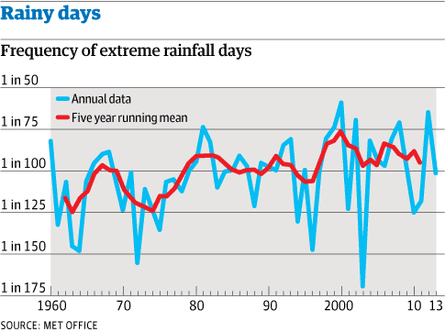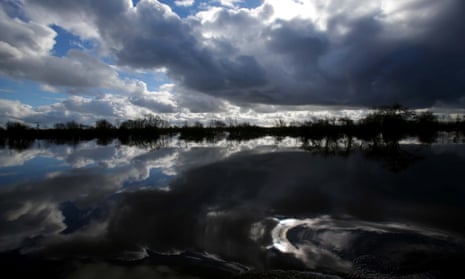The UK's weather will become both too wet and too dry – and also too cold and too hot – as climate change increases the frequency of extreme events, the Met Office has warned in a new report.
Its scientists concluded that on average the UK will see wetter, milder winters and hotter, drier summers in the long term due to global warming. But the natural year-to-year variability of weather will also mean occasional very cold winters, like that of 2010-11, and very wet summers, like that of 2012.
Recent years have seen highly variable weather in the UK, with a drought in early 2012 and the greatest deluge for at least 250 years and widespread flooding over the winter of 2013-14.
"We have to continue to live with the cold events, but get used to the warm events," said Professor Stephen Belcher, head of the Met Office's Hadley Centre and who led the report. "The boundaries we have to adapt to are expanding." He said that, on current trends of carbon emissions, the extreme European heatwave of 2003, which killed tens of thousands of people, would become a normal summer by the 2040s.

Scientists have already shown that the risk of heatwaves like the 2003 event has been at least doubled by climate change, as has the risk of flooding like that seen in 2000 in southern England. Researchers are currently investigating whether climate change exacerbated the risk of the record wet winter of 2013-14. The new report states: "The role of human influence on our climate is already detectable on summertime heatwaves and on the character of UK rainfall."
The Met Office found that days of heavy rain in the UK expected three times a year in the 1960s and 1970s are now happening more than four times a year.
Prof Jim Hall, at the University of Oxford and not involved in the Met Office report, backed its conclusions: "Some impacts of climate change are already materialising and they will impact via extremes."
The Met Office report comes ahead of a major report due on Monday on the global impacts of climate change from the Intergovernmental Panel on Climate Change (IPCC). Prof Belcher said: "Some of the impacts of climate change will come to the UK from events in countries outside the UK: the world is interconnected."
For examples, Prof Hall said, the extreme heatwave in Russia and eastern Europe in 2010 seriously damaged the wheat harvest: "UK food prices went up by 5% as a result." He said the UK was vulnerable to extreme weather elsewhere because it imports 40% of its food.
But adapting to climatic changes is difficult, Prof Hall said: "Even in a relatively well-governed country like the UK, adaptation is an uphill struggle. It is difficult to stitch together all the things you need to do."
He noted that building still takes place on flood plains, efforts to reduce water use in anticipation of droughts are not working and that infrastructure, such as the mailine railway that was washed in the sea at Dawlish in February, remains vulnerable.
In January, it was revealed that environment secretary Owen Paterson, widely regarded as a climate sceptic, has cut his department's funding for climate change adaptation work by almost half.
Other climate scientists, speaking at the Science Media Centre in London ahead of the IPCC report, warned of further impacts of climate change in the UK.
Professor Nigel Arnell, at the University of Reading, said: "The IPCC report will be the most fundamental assessment of the global impacts of climate change ever assembled. It is likely to show that the scale of potential damage and disruption to human activity across the world is enormous. Perhaps the greater risk to Britain is the potential of disruption elsewhere in the world, with the resultant impact on the global economy and the potential for security and humanitarian crises. In a globalised world, there is no hiding place from climate change."
Prof Andrew Challinor, at the University of Leeds and a lead author of the IPCC report, said crop yields in temperate regions were projected to fall by 5-10% in the 2030s and that falls of 25% will become more common after 2050.
Dr Sotiris Vardoulakis, at Public Health England, said more heat-related deaths would be expected and problems with allergens and with mental health issues related to extreme weather would increase. But he said there could be benefits to health if cutting carbon emissions reduced local pollution and if a shift to travel by cycling and walking increased the exercise people take.






Comments (…)
Sign in or create your Guardian account to join the discussion